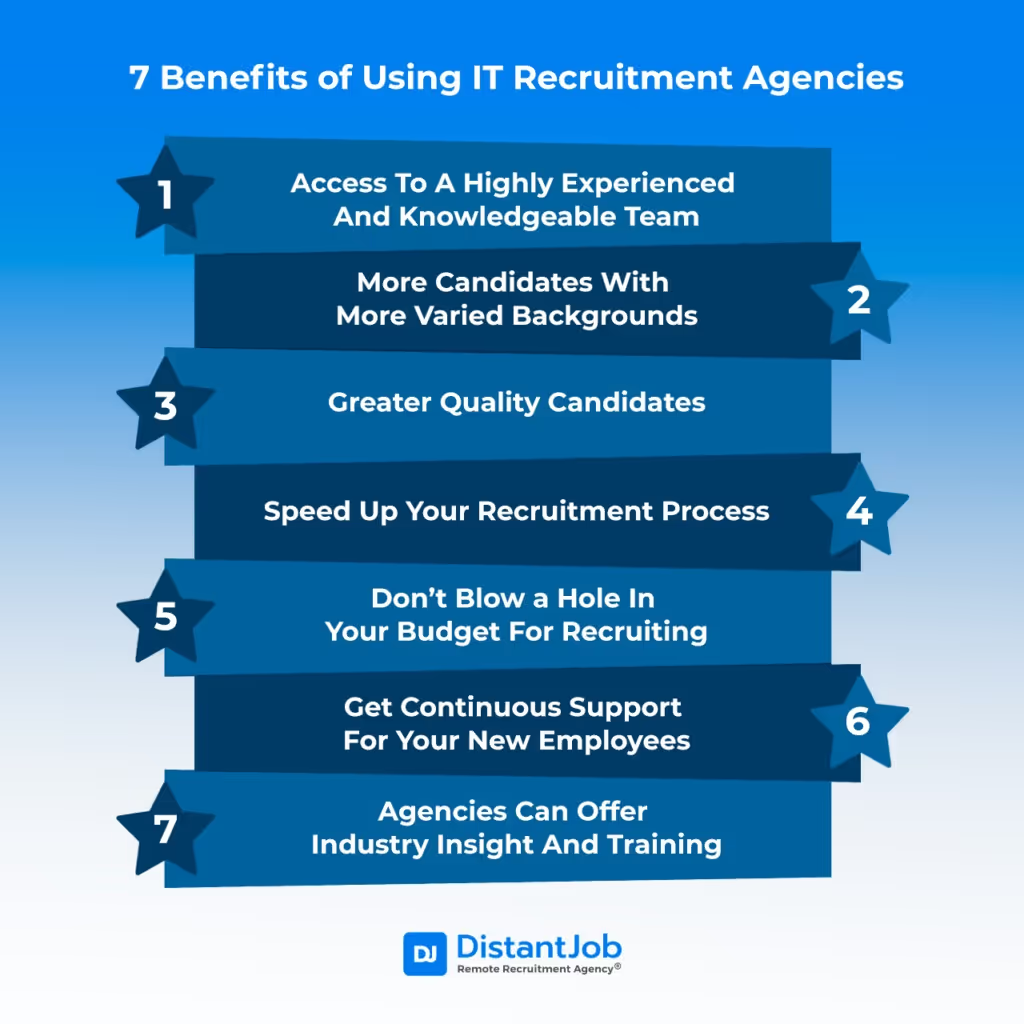Software development has seen a big rise lately, becoming super important in today's world. It's crucial for businesses to have good software to run smoothly. There are numerous ways to hire developers such as traditional hiring, freelance hiring, etc. However, using dedicated software outsourcing agencies is the safest bet. These agencies specialize in finding skilled developers, making sure they're reliable and fit your needs. With them, you can get top-notch talent without all the hassle and worry.

Traditional IT recruiting often involves an internal HR team or department spending time and resources to source, screen, and hire IT experts. This process can be time-consuming and may not always yield the best results due to limited networks and expertise in the IT field. On the other hand, outsourcing agencies specializing in IT recruitment have access to a wider pool of talent and expertise, along with established networks within the industry. They can streamline the hiring process, saving time and ensuring a higher quality of candidates. One of the primary reasons why many businesses now opt for outsourcing via a dedicated agency is that these agencies often have a better understanding of the specific skill sets required for various IT roles, leading to more precise matches between candidates and job requirements.
When a company needs to hire new IT experts, they usually start by posting job ads, looking at resumes, interviewing people, and negotiating job offers. But all these steps take a lot of time and effort. It means the people in charge of hiring, like HR teams or managers, spend hours and hours doing these tasks instead of working on other important things. For example, instead of working on new projects or helping customers, they're stuck looking at resumes and scheduling interviews. This can slow down the company's progress and make it harder for everyone to get their work done on time.
Sometimes, even if a company hires someone through the traditional way, they don't stay for very long. When this happens, it costs the company a lot of money. They might have to pay the person leaving some money to go away, spend more money finding and hiring someone new, and lose all the knowledge and experience the person had. Plus, when people keep leaving, it makes it harder for the team to work well together. They have to spend time getting used to new people instead of just doing their jobs. This can make projects take longer to finish and end up costing the company even more money.
Finding the right person for an IT job can be really tough. Sometimes, the usual ways of finding new employees, like posting job ads or asking friends, just don't work well for finding IT experts. That means the company might miss out on great candidates who aren't actively looking for a new job or who have specific skills. It's like trying to find the perfect puzzle piece in a big box of puzzle pieces, but only looking in one small corner of the box. You might miss out on the perfect piece because you're not looking in the right place.
When a company hires someone new, they usually have to spend some money teaching them how things work and what they need to do. This is called training. But training costs money, especially if the new person doesn't know everything they need to know for the job. And if it takes a long time for them to learn, it means the company has to wait longer to get the work done they hired them for. It's like buying a new video game but having to spend a lot of time learning how to play it before you can start having fun.
When a company spends lots of time and money looking for new employees the usual way, they miss out on chances to do other important things. Instead of just focusing on finding people to work for them, they could use that time and money to make new ideas, plan for the future, or grow their business. It's like spending all your time looking for one type of fish in the ocean when you could be doing other fun stuff too. So, if a company spends too much time looking for new employees, they might miss out on chances to make their business even better.
Besides the obvious costs of hiring someone new, like paying them a salary, there are other hidden costs too. Companies might have to pay for things like background checks, tests to see if the person is right for the job, or even travel costs if they have to meet candidates who live far away. These costs might not seem like a lot by themselves, but when you add them all up, they can be a big deal. It's like buying a new toy and then finding out you have to buy batteries separately to make it work. It's an extra cost you might not have thought about at first, but it can add up over time.
In this section, we discuss several other hidden costs of software development that highlight the importance of carefully managing projects, allocating resources effectively, and prioritizing quality and efficiency throughout the development lifecycle. Just as with traditional IT recruiting, understanding and mitigating these hidden costs can contribute to more successful and cost-effective software development outcomes.
Are you seeking efficient hiring solutions for your company? Blue Coding offers a seamless process for connecting you with skilled remote developers from Central and South America, along with additional technical support, IT guidance, and custom software solutions. All without any additional hidden costs of hiring developers! Reach out to us today for a free discovery call and we will help you discover the full range of services we offer.
Subscribe to our blog and get the latest articles, insights, and industry updates delivered straight to your inbox